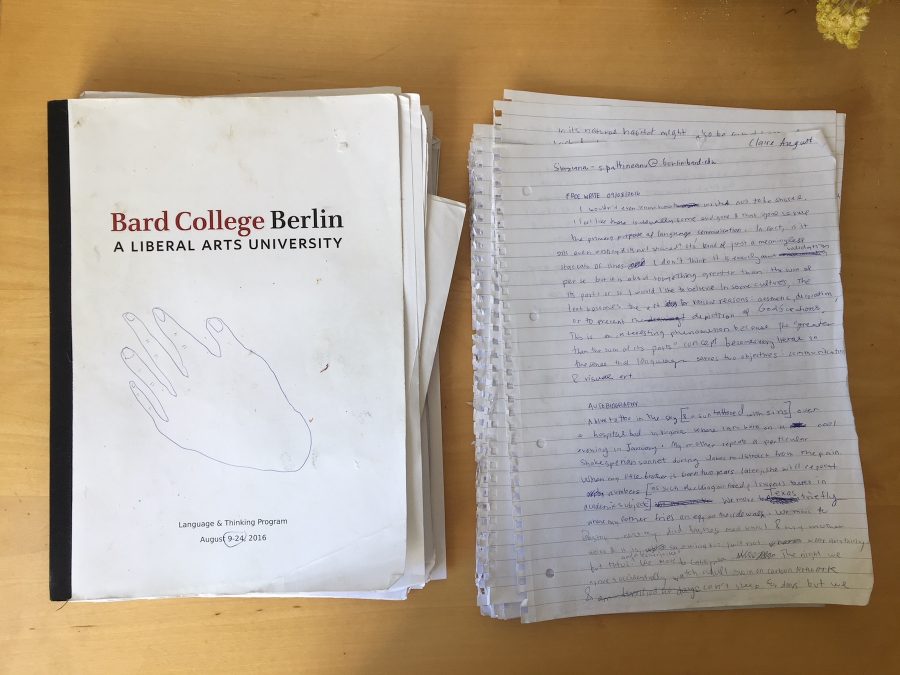This past May, I moved out of my first non-dorm housing in Berlin. Behind a dense pile of important documents that had been pressed tightly (carelessly?) against my bedroom wall, I rediscovered my Language and Thinking notebook, about half-filled and bound in red Bard College Berlin cardstock. I also found the course reader, stuffed with loose-leaf readings and sporting an anatomically-incorrect hand drawn on the cover in blue ink. In that top-floor summer heat just before June began, I couldn’t muster the energy to look through the notebook properly, so I put it aside and left it in a bag of other things to be brought to a friend’s flat later.
It is only now, just a few weeks before I plan on leaving BCB for a semester abroad at CEU in Budapest, that I am revisiting this little time capsule. As I prepare to leave again, I am reminded that my time in Berlin thus far has been punctuated, perhaps even defined, by a constant feeling of coming and going, beginning and ending: observing a flow of new students each semester, flat-hunting that has resulted in my brief residence in a host of Berlin neighborhoods, bidding farewell to fellow students graduating or studying abroad, a stream of strangers (including an older woman who always mistakes me for an old friend at the Rewe cafe… perhaps no longer a stranger). There is possibly no more literal way of revisiting an earlier chapter of my BCB experiences, of tracking these comings and goings, than by rereading my L&T notebook. It includes both diary-like private free writing and more direct responses to prompts: a strange relic that documents my first few weeks in this city. In the name of my looming departure date, this rereading seems appropriate and opportune.
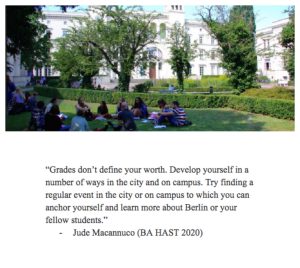
In response to a prompt where we should write just for ourselves, and not to be shared:
Is it still writing if it’s not shared? Just a meaningless staccato of words? Without sharing your writing is it anything more than the sum of its parts? I’m thinking now about calligraphy and other things where the actual words become art, like for aesthetic or sometimes religious reasons. This whole language that is “greater than the sum of its parts” concept becomes very literal in this context.
With these words, the L&T notebook begins. Our first assignment was to write an entry for ourselves alone — diary-like — an assignment that was repeated regularly throughout the course, as I quickly learned. It is ironic that I should begin with the discussion of calligraphy given the gradual degradation of handwriting throughout this notebook. This entry, nonetheless, raises issues that I did not resolve in the L&T program. These are issues I regularly think about, years after L&T: when are things meant to be shared; when are things meant to be kept quietly between you and yourself?
Got back from lunch. Potatoes, meat, and carrots. Lunch. Salmon + pastry + spinach.
Why I felt the need to include descriptions of every meal served in the cafeteria, I’m still not sure (the variety was exciting?). The wildly banal really does make its home in some of my journal entries, which were also intended to be about much larger questions than “What did you eat for breakfast today?”. I am reminded of Joan Didion’s essay, “On Keeping a Notebook,” in which she describes feeling like “some thrifty virtue derives from preserving everything observed” but that, in reality, this preservation is only a brief illusion. A notebook ultimately serves the individual author. She writes, “[O]ur notebooks give us away, for however dutifully we record what we see around us, the common denominator of all we see is always, transparently, shamelessly, the implacable ‘I.’” [*1] Such is perhaps the narcissistic reality of my fairly diligent meal descriptions, a heavy emphasis on this “I.”
Berlin As Home? I think I would have to know the streets better and speak German so I could converse with more generations of Berliners. I feel like I could gain some sense of belonging, but as for ‘home’, I’m not too sure. Maybe some things that happened in specific places, like personal landmarks. It is an intimidating prospect, weight down by permanence and its singularity [sic]?
I took the tram back to campus and we met a dude who lives in Pankow who could immediately identify that we were from the “American college.”
It’s been two years since I wrote this, almost to the day. My German is better, noticeably so, considering that I arrived here firmly believing that the definite feminine article “die” was pronounced like the English verb “die,” as in “to die.” The question remains, as per the L&T writing prompt that was assigned by our instructor: what would it take for Berlin to become home? An ongoing question. I will say that the longer I live here, the less I feel I know the city. A better knowledge of navigating, improved language skills, a few favorite parks, cafes, libraries, sure: I could claim all this, but the true character of the city continues to turn its face just when things seem to become familiar. To feel a sense of belonging in the city is possibly a quest not even worth undertaking: this is better left to life time Berliner*innen. But this constant lack-of-belonging does not preclude a sense of home, either, as I have also learned. As there are multiplicities of subcultures within a city, so too can there be a multiplicity of ‘homes’– in friends, a university, a neighborhood. It is perhaps too emotionally taxing, too draining, to assign yourself the task of finding the whole of Berlin to be a ‘home.’ A better task: What can you learn from where you are right now? How do your immediate surroundings, as distant as they might sometimes feel from a representative version of Berlin, nonetheless function within the city?
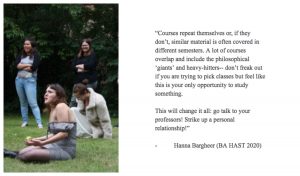
I think that we are getting a Semesterticket today which should make the commuting thing a lot easier & hopefully more frequent.
I do think that, since writing this sentence, my time in transit has become too frequent, though I respect my younger self’s passion for public transport.
Is Antigone a criminal? Is today a Wednesday?
Breakfast. Croissants, nutella, jam, 2 cups of coffee. It appears to be many cameras pointed in different directions. Breakfast — nutella, croissant + melon. I like writing quickly and unpolished but I can tell it isn’t everyone’s cup of tea.
Avocado (x ~20)
Given that I was not allowed to stop the pen from moving, my journal cumulates the repetition of the word ‘avocado,’ as I was at a loss for what else to say. I am charmed by my struggle to remember what day of the week it was, a testament to the whirlwind that was my first few weeks in Berlin.
*
Today I am sitting with a friend on the edge of the canal by Museumsinsel flipping through my old L&T notebook. I can see the Berliner Dom, packaged in scaffolding, and the faux-classical columns of the Alte Nationalgalerie. Groups of people on canal boats float past where we sit on the grass, moving quickly, sometimes waving. Berlin at the end of the summer is so perfectly pointless. Despite the falsity of the notion, I feel inclined to believe that no one has a thing to do in this world except station themselves in various parks and drink a Pilsner. I am thinking that I could write, if I wanted to, and I am thinking that I am deeply grateful to be here, in this exact spot. I am wondering, if I lost the notebook, if I somehow dropped it into the canal or if I accidentally left it behind and it ended up in the hands of an unsuspecting tourist, would the loss of this poorly-written thing bother me?
Probably.
I am also wondering if the people who are just arriving feel like they could make Berlin a home, and whether they too wonder about beginnings, and if they also write down their meals in their diaries.
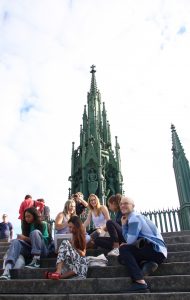
Despite its precarious position by the canal, the notebook and its hasty writings (“not everyone’s cup of tea”) is more distant in content and in style to me now than when I first authored it. Since the L&T program, I don’t think I have generated quite so much raw, unworked writing in such a short span of time. This unworked notebook is cringe-worthy in hindsight (thanks for detailing the minutiae of outdated gossip, past self), but, despite its flaws, there is something beautiful about the fact that I still have all these silly sentences. It is reminiscent of what Rosmarie Waldrop writes in “Alarms and Excursions,” one of my favorite excerpts from the L&T reader: “The key word here [for the writer] is the present, not being constrained by any considerations of the future in which the work might be read, appreciated, sold. It is a moment of being most completely myself, whether we call it unalienated or mad.” [*2]
Waldrop’s words on uninhibited writing (with perhaps a similar sentiment manifest in this notebook, albeit less elegantly described) seem like an appropriate welcome to Bard College Berlin — be this upon ending the L&T program or arriving at BCB via other paths. The freedom to explore, to write, and to think is not offered to most of us with the vigor and generosity that I would hope for in this world. However, for those lucky ones of us who end up in such a situation (e.g. through a liberal arts education, though this might not be the only means) the sense of freedom and comfort in the ‘selfness’ that Waldrop describes is no trifling business, but an opportunity for an invaluable exploration of the self. [*3] As the semester begins, I encourage you to carry the freedom and momentum of your L&T thought processes and writing structures with you, along with a few notable moments of summer daydreaming. Remain critical, document when you can and if it gives you pleasure, and, perhaps most importantly, allow yourself to maintain the freedom of intellectual inquiry fostered during L&T.
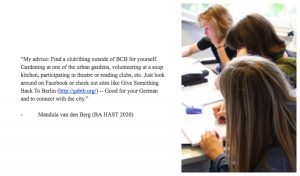
When is the beginning? Beginning is a word I sometimes cannot spell. Beginnings are fragile, delicately progressing towards a middle or even end without our consent consent consent consent [sic]. Like when a new character walks into the scene of a movie and someone asks you, “Who is that?” & you’re like, “No, I just started this movie too.” I am quite thirsty and could use some coffee coffee coffee. I am supposed to move the pen and I am supposed to move the pen and if I cannot, I am supposed to repeat repeat repeat words.
This haphazard entry was one of the first I found in this journal. I think it was written in response to a prompt about ‘beginnings’, but I forget the exact wording. Clearly, in addition to forgetting the wording of the prompt, I seem hardly able to remember how to spell the word ‘beginning’ itself. It seems that every summer, just as I am returning to school, university, etc, I do in fact lose a few key brain cells, and the summer leading up to the Language and Thinking Program in which I participated in 2016 was no exception. Despite my very at-risk ability to form sentences, I appreciate the familiarity of my statement — it feels as true now as it did then, as I move towards a new ‘beginning’ at a new university. And perhaps it might ring true for you, too, dear reader: a beginning is an upended and fragile little thing, departs quicker and sets in with more haste than the end. How to start, how to begin, at a new university, in a new city? Another ongoing question.
Notes:
[*1] Didion, Joan. 1968. Slouching Towards Bethlehem. New York: Farrar, Straus & Giroux. (Read the entire essay online here)
[*2] Waldrop, Rosemary. “Alarms & Excursions.” The Politics of Poetic Form. [S.l.]: Roof, 1990. Print.
[*3] For more about a liberal arts education, check out Margarethe Hattingh’s most recent article on the Liberal Education Student Conference that took place in Utrecht in May 2018.

